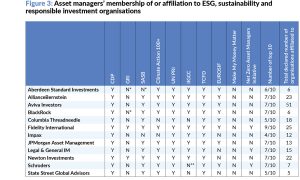Asset managers operating in the UK DC pensions market are affiliated to a staggering 134 separate ESG bodies, according to new research from Corporate Adviser Insight.
For the first time, the full extent of the confusing array of investor networks, forums, steering groups, committees, standards organisations and campaigns groups cited by UK DC asset managers has been revealed by Corporate Adviser Intelligence’s ESG in DC Pensions Report.
Many of these organisations are focused on reducing climate change and in particular meeting the targets of the Paris Agreement. Some of these groups offer accreditation to affiliated asset managers and pension providers who sign up to their principles of agree to meet certain pledges.
While some of these are ‘broad tent’ organisations with relatively flexible affiliation criteria, others have stricter requirement of acceptance.
Given the proliferation of organisations this can make it difficult to advisers, employers and investors to assess the relative merits of an asset manager or pension providers ESG ‘credentials’.
As part of this report, Corporate Adviser Insight asked about asset management engagement with 10 of the highest profile RI coalitions and alliance – the details of each organisation are listed at the bottom of this article.
The  report reveals Fidelity International is affiliated to nine out of 10 of these organisations. AllianceBernstein, Aviva Investors, BlackRock, JPMAM, LGIM, Newton Investments and Schroders all engage with seven out of 10 of these groups.
report reveals Fidelity International is affiliated to nine out of 10 of these organisations. AllianceBernstein, Aviva Investors, BlackRock, JPMAM, LGIM, Newton Investments and Schroders all engage with seven out of 10 of these groups.
The table showed Impax, and ESG and environmental specialist is allied to just four, while SSGA has only signed up to five of the 10 leading affiliation campaigns identified in this report, yet is one of only two asset managers in this report to be named in the UN PRI’s Leaders Group on climate change, an endorsement held by just 1 per cent of asset managers.
The complex ecosystem is further complicated complicated by some organisations overlapping or partnering with other organisations. For example investor initiative Climate Action 100+ is co-ordinated through five regional networks: Asia Investor Group on Climate Change (AIGCC), Ceres, Investor Group on Climate Change (IGCC), Institutional Investors Group on Climate Change (IIGCC) and Principles for Responsible Investment (PRI).
Corporate Adviser also asked asset managers which other ESG organisations they were affiliated to. Aviva Investors cited the most groups, with 51 separate affiliations.
The full list covers a range of organisations from general climate-related bodies: such as the Climate Bond Initiative, the Climate Financial risk Forum, the Climate Leadership Council, the, the Carbon Trust Standards and the Center for Climate and Energy Solutions, the Coalition for Climate-Resilient Investment, and the ClimateWise Principles.
There are also a range of bodies covering very specific ESG initiatives, for example the Plastic Solutions Investor Alliance, the Farm Animal Investment Risk and Return Initiative, Electric Vehicles 100 (EV100) and the Investors Mining & Tailings Safety Initiative.
10 High profile ESG and RI organisations
- CDP (formerly Carbon Disclosure Project): Runs a global environmental disclosure system. Each year CDP supports thousands of companies, cities, states and regions to measure and manage their risks and opportunities on climate change, water security and deforestation at the request of their investors, purchasers and city stakeholders.
- GRI (Global Reporting Initiative): An independent, international organisation that helps businesses and other organizations take responsibility for their impacts, by providing them with the global common language to communicate those impacts. It provides the world’s most widely used standards for sustainability reporting – the GRI Standards.
- SASB (Sustainable Accounting Standards Board): The Sustainability Accounting Standards Board (SASB) is an independent non-profit organisation that sets standards to guide the disclosure of financially material sustainability information by companies to their investors. SASB Standards identify the subset of environmental, social, and governance (ESG) issues most relevant to financial performance in each of 77 industries. SASB also provides education and other resources that advance the use and understanding of its Standards.
- Climate Action 100+: Requires commitments from boards and senior management to implement a strong governance framework which clearly articulates the board’s accountability and oversight of climate change risk; take action to reduce greenhouse gas emissions across the value chain, consistent with the Paris Agreement’s goal of limiting global average temperature increase to well below two degrees Celsius above pre-industrial levels, aiming for 1.5 degrees; and provide enhanced disclosure in line with TCFD.
- UN PRI: Institutional investors pledge that they believe ESG issues can affect the performance of investment portfolios. Signatories also recognise that applying six prescribed ESG principles may better align investors with broader objectives of society.
- IIGCC (Institutional Investors Group on Climate Change): The European membership body for investor collaboration on climate change. Has more than 270 members, mainly pension funds and asset managers, across 16 countries.
- TCFD (Task-Force of Climate-related Financial Disclosures): A global effort to achieve standardisation of carbon reporting
- EUROSIF: An association for the promotion and advancement of sustainable and responsible investment across Europe. UKSIF is a member of EUROSIF
- Make My Money Matter: A people-powered campaign aiming to ensure investors understand where their money is invested and encourage switching away from harmful investments towards those aligned with the UN SustainableDevelopment Goals and the Paris Agreement.
- Net Zero Asset Managers Initiative: A group of international asset managers committed to supporting the goal of net zero greenhouse gas emissions by 2050 or sooner, in line with global efforts to limit warming to 1.5 degrees Celsius; and to supporting investing aligned with net zero emissions by 2050 or sooner.
 CLICK HERE TO SEE THE AGENDA – GUY OPPERMAN MP, MINISTER FOR PENSIONS, CONFIRMED AS KEYNOTE
CLICK HERE TO SEE THE AGENDA – GUY OPPERMAN MP, MINISTER FOR PENSIONS, CONFIRMED AS KEYNOTE





